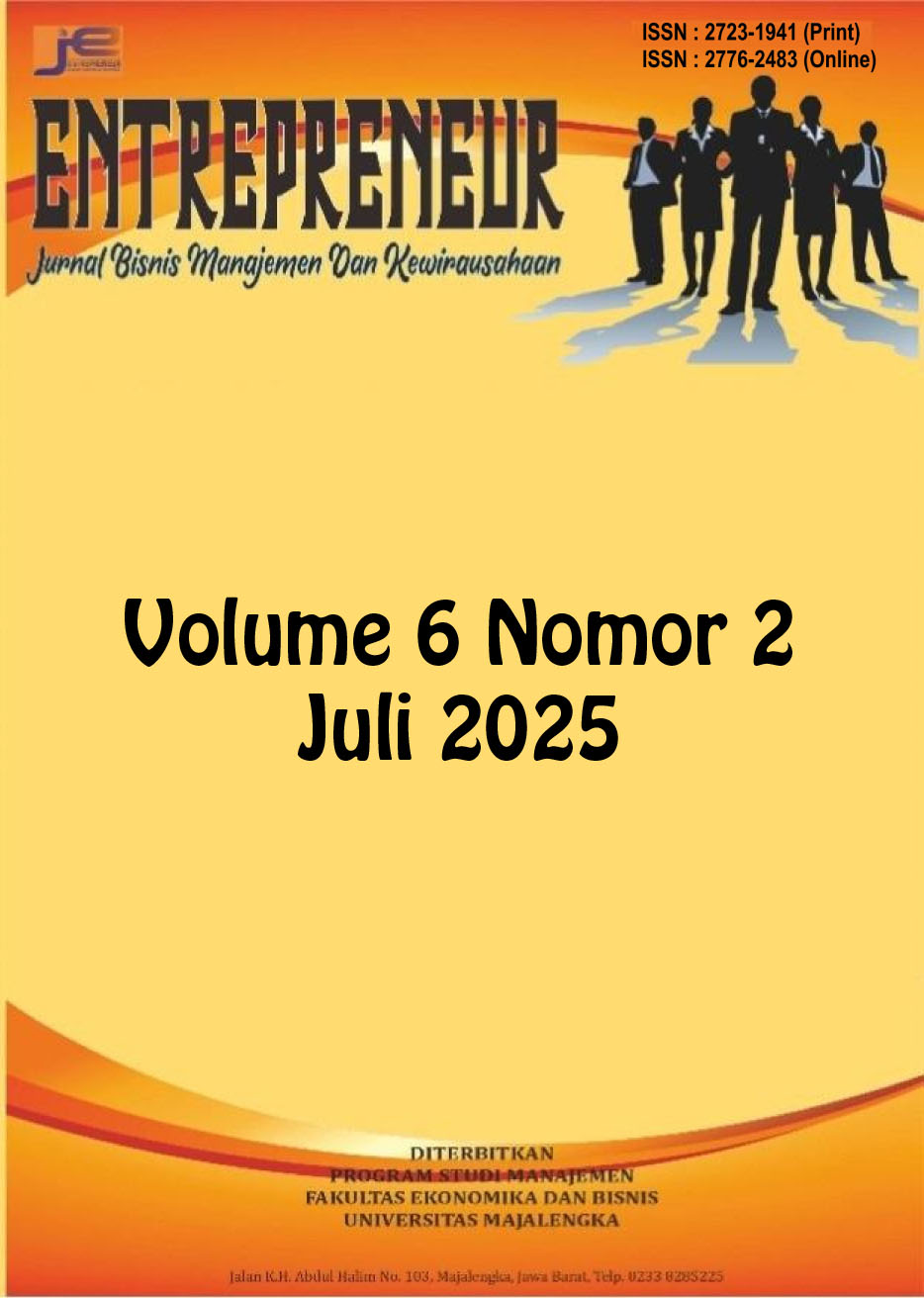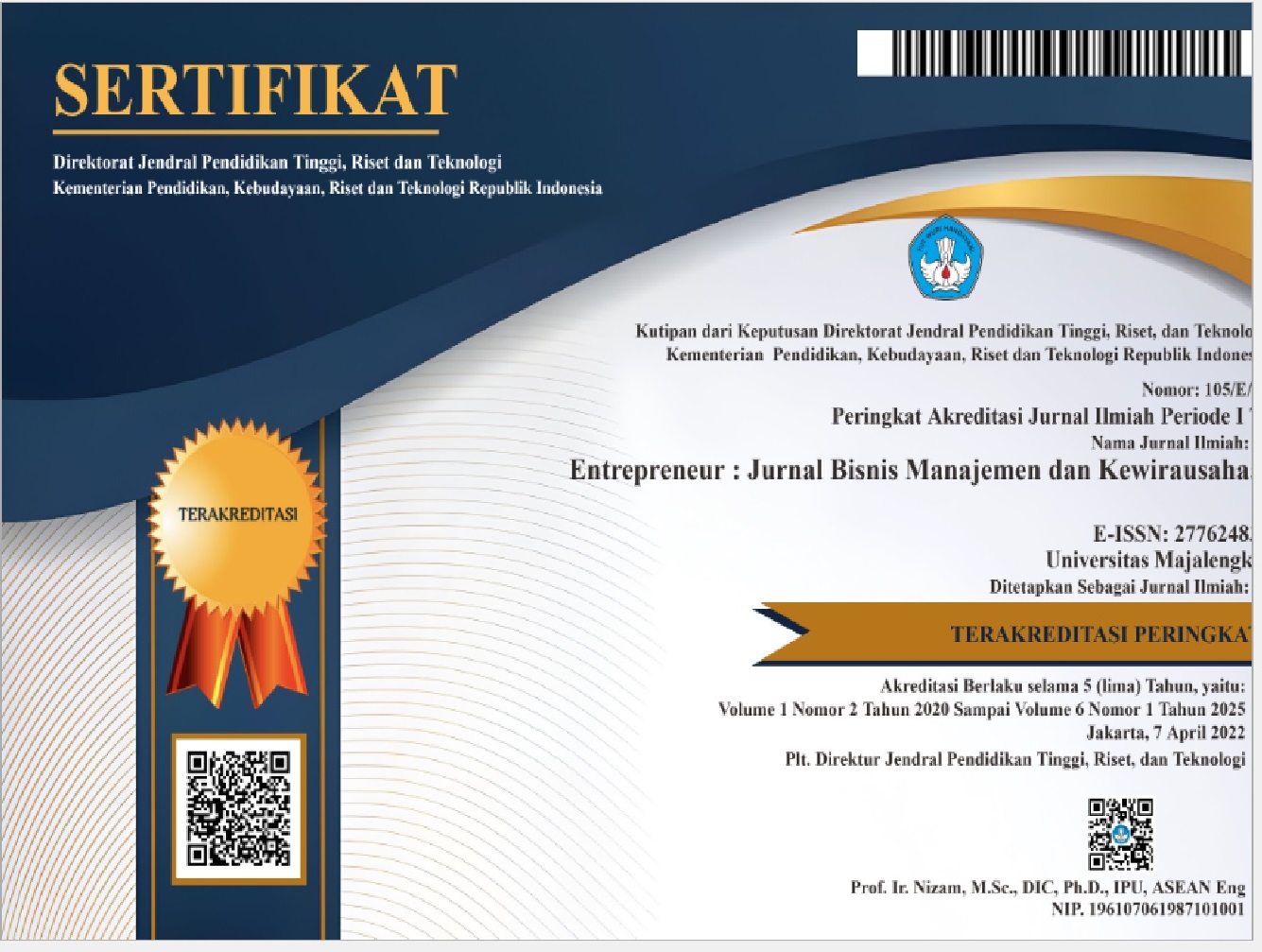Manajemen Literasi Dalam Mendorong Inovasi
DOI:
https://doi.org/10.31949/entrepreneur.v6i2.13994Abstract
Hospital expansion is driven by demand for health services due to the uneven health facilities in Bekasi Regency. This study aims to analyse the development strategy of Putra Medika Hospital using TOWS Analysis and Exploratory Mixed Methods. This research method is mixed. The qualitative phase began with in-depth interviews with the management of the Putra Medika Group Clinic to identify strengths, weaknesses, opportunities and threats. This qualitative data became the foundation for formulating the TOWS matrix. Then, the quantitative phase in the form of a survey was conducted on prospective patients and stakeholders, validating the qualitative findings and measuring market preferences. The qualitative participants were 22 people while the quantitative sample was 40 people. The results of the TOWS analysis show that Putra Medika has internal strengths to capitalise on market opportunities, but also needs to overcome weaknesses and manage competitor threats. In conclusion, Putra Medika Clinic management must integrate the findings of internal and external factors to produce concrete strategic recommendations for hospital development. These include optimisation of superior services, effective marketing strategies, and risk mitigation. The implications of this research offer practical guidance for Putra Medika's management so that expansion in Bekasi can be carried out in a sustainable and competitive manner.
Keywords:
Management, Literacy, Encouraging, InnovationDownloads
References
Ahmad, S., Umirzakova, S., Mujtaba, G., Amin, M. S., & Whangbo, T. (2023). Education 5.0: Requirements, Enabling Technologies, and Future Directions. arXiv. https://arxiv.org/abs/2307.15846
Azizah, I., & Salim, M. (2022). Peningkatan Literasi di Daerah Terpencil Melalui Teknologi Pembelajaran. Jurnal Teknologi dan Pendidikan, 13(4), 299-307. https://doi.org/10.57008/jtp.v13i4.3782
Azhar, M., Iskandar, I., & Fitriani, S. (2023). Peran Guru dalam Mengembangkan Literasi Pendidikan di Sekolah. Jurnal Pendidikan dan Inovasi, 5(2), 85–98. https://doi.org/10.12345/jpi.v5i2.2048
Christensen, C. M., Horn, M. B., & Johnson, C. W. (2008). Disrupting Class: How Disruptive Innovation Will Change the Way the World Learns. McGraw-Hill.
Creswell, J. W., & Creswell, J. D. (2018). Research design: Qualitative, quantitative, and mixed methods approaches (5th ed.). Thousand Oaks, CA: SAGE Publications.
Daryanto, A. (2023). Manajemen Pembelajaran dan Literasi Pendidikan. Jakarta: Rineka Cipta.
Fadhilah, F., et al. (2024). Keterlibatan Komunitas dalam Meningkatkan Literasi Pendidikan di Daerah Terpencil. Jurnal Pengembangan Pendidikan, 6(3), 221-230. https://doi.org/10.57008/jpp.v6i3.2765
Frisnoiry, S. (2024). Transformasi pendidikan menuju literasi dalam era globalisasi: Tantangan dan peluang. Jurnal Pendidikan Matematika Malikussaleh, 4(1), 1–10. https://doi.org/10.29103/jpmm.v4i1.13860:contentReference[oaicite:7]{index=7}
Fullan, M. (2007). The New Meaning of Educational Change (4th ed.). Teachers College Press.
Hidayat, M. (2022). Tantangan Implementasi Literasi Pendidikan di Sekolah di Daerah Tertinggal. Jurnal Penelitian Pendidikan, 4(3), 1–12. https://doi.org/10.31004/jpp.v4i3.2789
Iskandar, S. (2023). Literasi Pendidikan sebagai Pilar Inovasi Pembelajaran di Sekolah. Jurnal Inovasi Pendidikan, 8(1), 40–51. https://doi.org/10.1016/jip.v8i1.3312
Ixfina, F. D., Nurdianah, L., & Diana, R. F. (2023). Peran Guru dalam Mengembangkan Budaya Literasi di Madrasah Ibtidaiyah Al Fithrah Surabaya. Jurnal Jendela Pendidikan, 3(04), 401–410. https://doi.org/10.57008/jjp.v3i04.572
Kurnia, F., Subroto, D. E., Hayati, R., Nurlely, L., Agustina, P., Suyitno, M., Dewi, N. K., S, M. I., Evenddy, S. S., Fajrianti, Z., Astuty, H. S., & Pohan, S. H. (2023). Inovasi Pendidikan. Sada Kurnia Pustaka. ISBN 978-623-09-3113-0
Miles, M. B., Huberman, A. M., & Saldaña, J. (2014). Qualitative data analysis: A methods sourcebook (3rd ed.). Sage Publications.
Nasarudin, S. P. (2023). Inovasi Pendidikan: Gagasan dan Konsep. ResearchGate. https://www.researchgate.net/publication/378462418_Inovasi_Pendidikan_Gagasan_dan_Konsep
Nuryana, Z. (2023). Knowledge management sebagai upaya pengembangan learning organization di lembaga pendidikan Islam. Literasi: Jurnal Ilmu Pendidikan, 5(1), 1–10. https://ejournal.almaata.ac.id/index.php/LITERASI/article/view/441/0
Rahmawati, D., Aziz, S., & Hidayati, M. (2023). Pengaruh Literasi Pendidikan terhadap Hasil Belajar Siswa di Sekolah Menengah Pertama. Jurnal Pendidikan Indonesia, 5(1), 112-118. https://doi.org/10.57008/jpi.v5i1.4373
Rohman, A. (2022). "Literasi dalam Meningkatkan Kemampuan Berpikir Kritis di Era Disrupsi." EUNOIA (Jurnal Pendidikan Bahasa Indonesia), 2(1), 40–50. DOI: 10.30821/eunoia.v2i1.1318
Rogers, E. M. (2003). Diffusion of Innovations (3rd ed.). Free Press.
Santoso, A. (2024). Pengaruh Integrasi Teknologi dalam Pembelajaran terhadap Pengembangan Literasi Digital. Jurnal Teknologi dan Pendidikan, 13(4), 299-307. https://doi.org/10.57008/jtp.v13i4.3782
Sahin, A. (2023). Strategi Keberhasilan Inovasi Pendidikan: Teori Rogers. Kompasiana. Diakses dari: https://www.kompasiana.com/arif39900/6535df9fedff766edf69fd02/strategi-keberhasilan-inovasi-pendidikan-teori-rogers
Widiyono, Y., Purwanto, J., Ermaeni, E., Susilo, J., & Triyati, T. (2024). Peningkatan Literasi Mutu Pendidikan Melalui Pemanfaatan Teknologi di Sekolah. Surya Abdimas, 8(3), 442-448. https://doi.org/10.37729/abdimas.v8i3.3499
Yusuf, A. (2023). Inovasi Pendidikan: Gagasan dan Konsep. ResearchGate. https://www.researchgate.net/publication/378462418_Inovasi_Pendidikan_Gagasan_dan_Konsep

Published
How to Cite
Issue
Section
License
Copyright (c) 2025 Tenriwati, Sri Rahayu

This work is licensed under a Creative Commons Attribution-ShareAlike 4.0 International License.
COPYRIGHT NOTICE
An author who publishes in the Entrepreneur: Jurnal Bisnis Manajemen dan Kewirausahaan agrees to the following terms:
1. Author retains the copyright and grants the journal the right of first publication of the work simultaneously licensed under the Creative Commons Attribution-ShareAlike 4.0 License that allows others to share the work with an acknowledgment of the work's authorship and initial publication in this journal
2. The author is able to enter into separate, additional contractual arrangements for the non-exclusive distribution of the journal's published version of the work (e.g., post it to an institutional repository or publish it in a book) with the acknowledgment of its initial publication in this journal.
3. The author is permitted and encouraged to post his/her work online (e.g., in institutional repositories or on their website) prior to and during the submission process, as it can lead to productive exchanges, as well as earlier and greater citation of the published work







